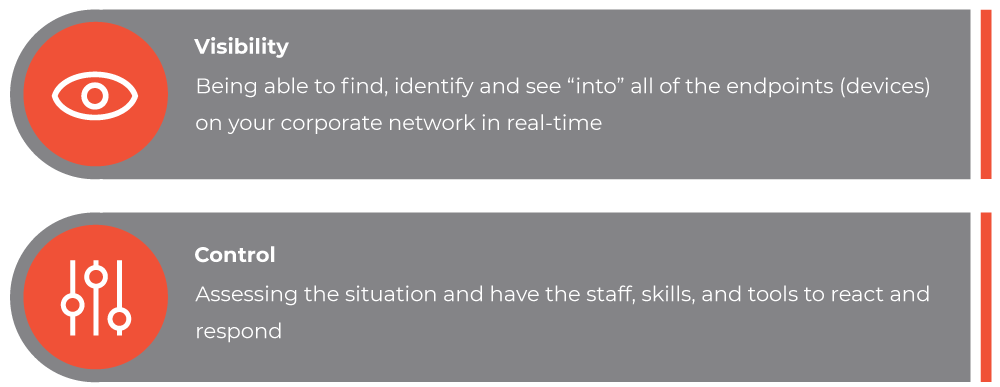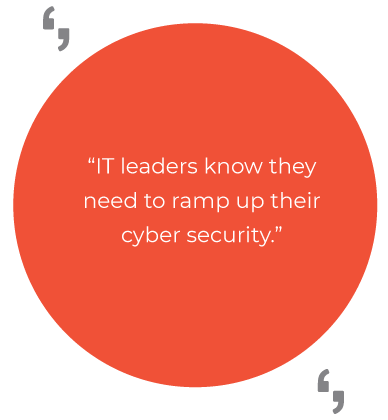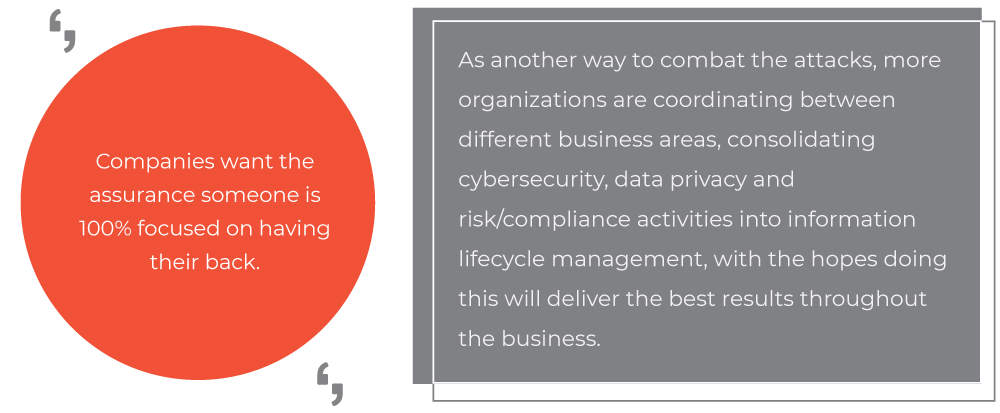

May 21, 2019 - by Tim Britt
Nothing changes faster than the Cybersecurity landscape. Just as businesses divert one security threat, several more take its place and test cyber protections at every turn.
And it shows no signs of slowing down. The cyber underworld continues to evolve and consolidate and there’s greater coordination among cybercriminals using the underground market. This has allowed them to become more effective.
IT leaders know they need to ramp up their Cybersecurity and several reasons are pushing this mindset — from numerous headline-worthy data breaches, ransomware strikes and malware attacks to strict government regulations. As efforts heighten to improve security — cost is another factor — which can soar into the millions.
So even if change is needed, it’s not happening everywhere because Cybersecurity can get expensive quickly. Many companies are still under threat, ill-equipped, and vulnerable.
Organizations are still modifying their efforts to improve Cybersecurity practices — a constantly moving target that seems to demand more every year. IT leaders used to have just a perimeter problem and companies simply needed the ability to hold down that perimeter. Now the playing field has widened — from employee devices and remote workers to access by third-party vendors and contractors.
Aimed at a precise target, this type of attack is organized and continuous and is achieved by combining “phishing email” with “malware,” like viruses and worms. Emails are sent under the guise of normal business communications either from known or related people and organizations to the target, and then infection spreads with malware when the recipient opens the file.
The criminal’s aim is to make money and create disruption — from cyber terrorism aimed at governments to organized cybercrime attempting to take funds from financial institutions and corporations. What’s more, digital warfare is becoming an important tool of government control. In 2016, NATO expanded its definition of “war domains” beyond air, land and sea to include cyberspace and its members are now co-operating here in the U.S. Still, cyber protection in private business has been slow to evolve, with many organizations simply resigned to the fact that their infrastructure will be breached and instead, focus on minimizing the ensuing damage.
A cyberattack significantly damages consumer and employee trust, hurts a company’s market share, eats away at profits and returns, and stops operations. Companies need to improve Cybersecurity, compliance and risk mitigation — they know these threats can kill their businesses.
With the General Data Protection Regulation, regulations are pushing companies to improve Cybersecurity, compliance and data privacy practices. These laws are demanding that companies invest in certain cyber priorities which means increased spending, hiring and investment in Cybersecurity related technology projects. Not surprisingly, security and security-related topics are at the forefront of the boardroom and the C-suite.
The tight IT labor market has many CIO’s admitting a lack of talent is holding their organizations back from keeping pace with technological change.
Ultimately, there are two main elements needed to maintain operational readiness against a Cybersecurity threat:


One overarching trend is that organizations — particularly those with more mature Cybersecurity operations — are investing heavily in next-generation Cybersecurity technologies that use artificial intelligence and automation to analyze security-related data points and pinpoint the activities that are the most threatening. On the flip side, Cybercriminals see the opportunity in the technology as well, particularly when it comes to evasion techniques, which enable the criminals to avoid detection and circumvent security.
Enter AI-based and other next-generation Cybersecurity tools, which are taking advantage of emerging technology to detect and ward off increasingly sophisticated threats. To improve security capabilities, tools that use artificial intelligence to monitor device and user behavior and flag anything suspicious will be arriving on the forefront in the next few years, if not sooner.

They’re also looking for outside resources and expertise. In an area that changes at the blink of an eye, companies want the assurance someone is 100% focused on having their back. Partnering with a company that specializes in Cybersecurity, the end goal is always quick remediation and should include not only a dedicated security staff, security training the latest Cybersecurity analysis and defense tools but also constant assessing and current awareness of trends and emerging threats.
Source: Data Breach Investigations Report, Verizon
All told, consumer data is a digital gold mine. So, if you suffer a loss, your customers not only want to know what you’ll do going forward, but what safeguards you already have in place. Data can always be recovered — trust can’t. When you put all the necessary steps in place to strengthen your Cybersecurity, you’ll help protect your customers valuable information and, ultimately, your brand.
Download PDFTim Britt is founder and CEO of Synoptek, a Global Systems Integrator (SI) and Managed IT Services Provider (MSP) offering Comprehensive IT Management and Consultancy Services to organizations worldwide. An entrepreneur at heart — Tim leverages technology to squash the status quo and create solutions for his clients — a mission he’s been on for more than 20 years.